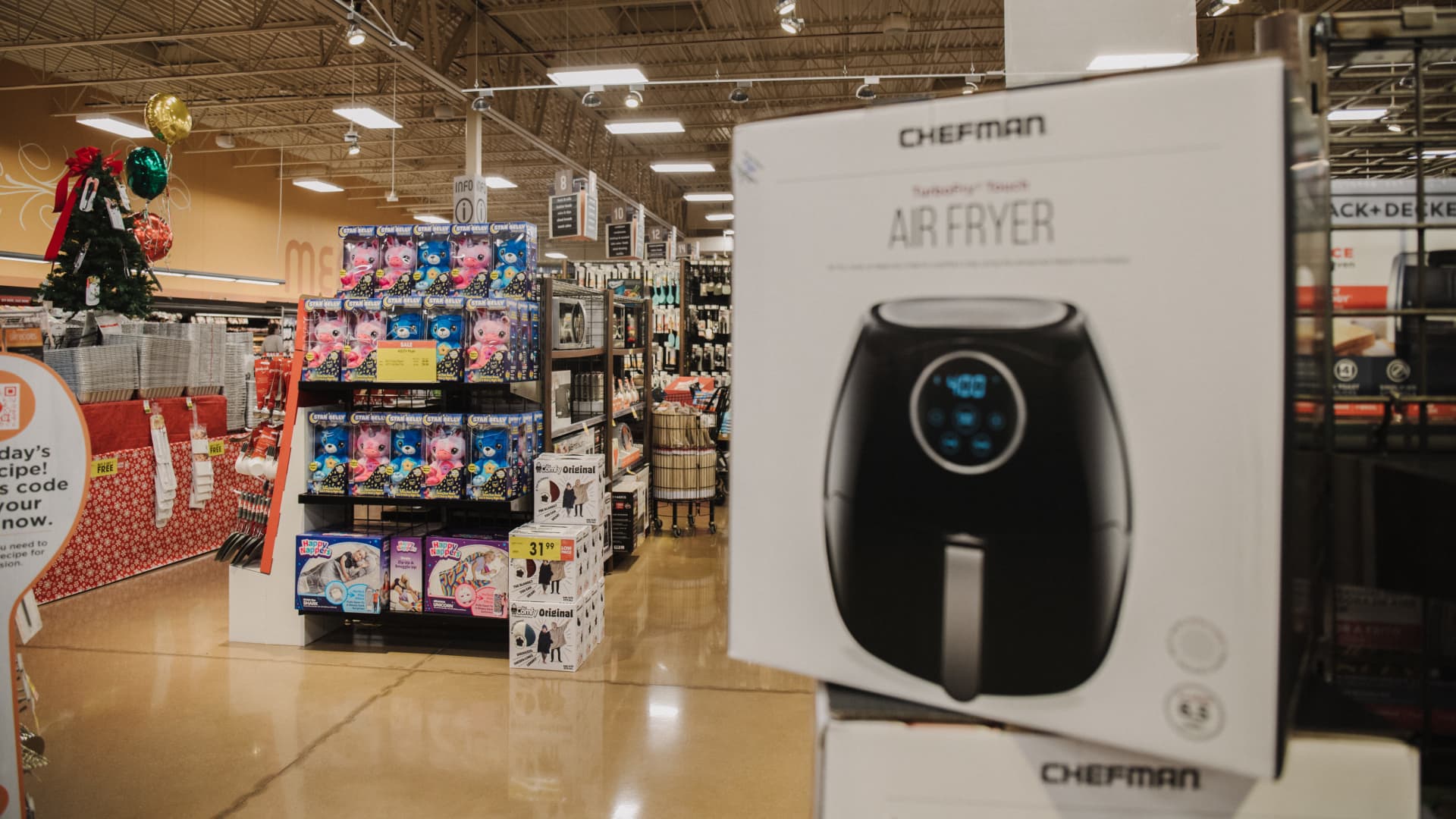Kettle Foods, known for its kettle-cooked potato chips, recently unveiled what it called “the future of the potato chip category”: air-fried chips.
The Campbell Soup brand’s snack launch, made with patent-pending technology, is the latest example of Big Food betting on consumers’ love of all things cooked in air fryers.
In 2022, U.S. consumers spent nearly $1 billion buying air fryers, up 51% from 2019, according to market research firm The NPD Group. Sales of the cooking appliance have been soaring since 2017, and they received an extra boost during the early days of the pandemic as people cooked more at home.
And now with more workers returning to the office and spending less time in the kitchen, consumers are increasingly turning to the portable convection ovens. Joe Derochowski, home industry advisor at the NPD Group, said the main draw is the ease and speed of using the appliance, plus achieving a crispy texture without deep-frying. And food manufacturers want to capitalize on the trend.
“They say necessity is the mother of invention. And in this case, the necessity is to continue to grow the top line,” said Ken Harris, managing partner at Cadent Consulting Group. “The best way to grow the top line is to take behavior that already exists and find a new use for that behavior.”
Big food companies like Kraft Heinz and Nestle saw a surge of sales early in the pandemic. When consumers started eating out at restaurants again and cooking less, food manufacturers’ sales still kept growing thanks to double-digit price hikes. But as shoppers’ grocery bills climbed in 2022, they started buying cheaper options instead, leading to shrinking volume.
As inflation cools and retailers put pressure on suppliers to stop raising prices, food companies have had to look for growth elsewhere.
Adam Graves, president of Nestle U.S.’s pizza and snacking division, said the company is leaning into the air fryer boom through its frozen food brands, specifically to offer customers more value.
“It’s the biggest trend that we’re seeing right now in modern cooking,” said Graves, who owns two air fryers himself.
Last year, Nestle launched pizza bites under its DiGiorno and Stouffer’s brands. Both lines’ packaging tells consumers “Try It in Your Air Fryer.” Other Nestle products, like Hot Pockets, now include air fryer cooking instructions alongside directions for heating up in the microwave and oven.
Tyson Foods jumped on the trend relatively early, launching its air-fried line in 2019. The products, ranging from chicken strips to its newest addition, parmesan-seasoned chicken bites, contain 75% less fat. Colleen Hall, senior marketing director of the Tyson brand, said the line has reached roughly $100 million in annual retail sales.
Tyson is also a third of the way through adding air fryer directions to its packaging for its frozen prepared foods.
“If you look at how often it gets used as a preparation method, it’s around 5%,” Hall said. “I think consumers want to use it more, they want more options to use it. So it’s good timing for us to be putting it on our packaging.”
The air fryer directions are boosting Tyson’s brand favorability, according to Hall, who cited recent brand health data. She chalked it up to the convenience of the appliance and the perceived health benefits of the cooking process.
For fishstick maker Gorton’s Seafood, getting more into air frying is a means of holding on to the customers it gained during pandemic lockdowns.
“[The pandemic] was a pretty dramatic shift that brought a lot of new households into our category and into the brand,” Jake Holbrook, Gorton’s vice president of marketing, told CNBC. “And we’ve worked hard through our messaging and our products to keep those consumers in the category and keep Americans eating more seafood.”
The bandwagon is filling up
Air frying is the second-most popular way to heat up frozen prepared foods, according to Holbrook.
The company, which is owned by Nissui, got into the trend by putting air fryer cooking instructions on its website. Then it added the directions to packaging. In January, it unveiled Air Fried Butterfly Shrimp and Air Fried Fish Fillets.
Gorton’s new butterfly shrimp and fish fillets were cooked by air frying before being packaged, but consumers can heat the seafood up by air frying it again. The products’ packaging touts that it contains 50% less fat.
“Everyone will jump on this bandwagon for the next two years while it’s trendy,” Harris said.
Other food makers following the trend include Kellogg, which started including air fryer instructions for its plant-based Morningstar Farms products in early 2021 in response to customer inquiries. Likewise, Hormel Foods has been responding to consumers’ air fryer demand by updating its packaging and adding recipes on its website and cooking videos on YouTube to create Spam fries and Mary Kitchen corned beef hash.
Nestle has gone even further, targeting consumers who haven’t yet bought an air fryer. In December, it partnered with Insta Brands, the maker of the Insta Pot and its own version of the air fryer, to give away the appliance. It ran a similar giveaway internally at Nestle U.S. for its employees.
Graves estimates that roughly 60% of U.S. households have an air fryer at this point. But it’s not ubiquitous yet.
“If you benchmark it to a microwave — there’s a microwave in practically everyone’s home — the air fryer’s got a long way to go,” Harris said.
Still, it’s well on its way to joining the microwave as a staple in U.S. kitchens. In 2022, the air fryer leapfrogged over grills and multicookers to become the No. 4 cooking appliance, according to the NPD Group.
“I think people originally thought [the air fryer] was something that might be a fad,” Tyson’s Hall said. “It’s similar to the 1970s — people thought the same thing about the microwave.”
